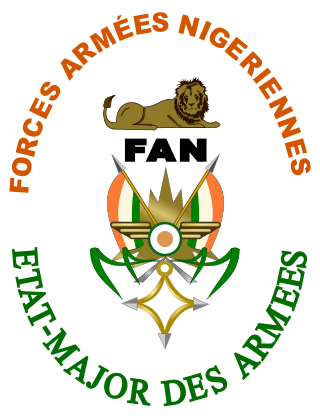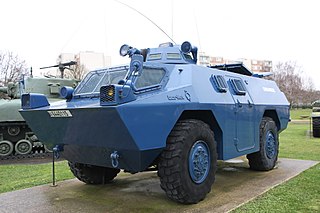
The Niger Armed Forces includes military armed force service branches, paramilitary services branches and the National Police of Niger. The Army, Air Force and the National Gendarmerie are under the Ministry of Defense whereas the National Guard and the National Police fall under the command of the Ministry of Interior. With the exception of the National Police, all military and paramilitary forces are trained in military fashion. The President of Niger is the supreme commander of the entire armed forces. The National Assembly of Niger passed a statute for the Army of Niger in November 2020, planning for the army's size to increase from 25,000 personnel in 2020, to 50,000 in 2025 and finally 100,000 in 2030.

The National Police, formerly known as the Sûreté nationale, is one of two national police forces of France, the other being the National Gendarmerie. The National Police is the country's main civil law enforcement agency, with primary jurisdiction in cities and large towns. By contrast, the National Gendarmerie has primary jurisdiction in smaller towns, as well as in rural and border areas. The National Police comes under the jurisdiction of the Ministry of the Interior and has about 145,200 employees. Young French citizens can fulfill their mandatory service in the police force.
An inspector general is an investigative official in a civil or military organization. The plural of the term is "inspectors general".

Law enforcement in France is centralized at the national level. Recently, legislation has allowed local governments to hire their own police officers which are called the police municipale.

The Maritime Gendarmerie is a component of the French National Gendarmerie under operational control of the chief of staff of the French Navy. It employs 1,157 personnel and operates around thirty patrol boats and high-speed motorboats distributed on the littoral waterways of France. Like their land-based colleagues the Gendarmes Maritime are military personnel who carry out policing operations in addition to their primary role as a coast guard service. They also carry out provost duties within the French Navy.
Raoul Victor Patrice Castex was a French Navy admiral and a military theorist.
An army corps general or corps general is a rank held by a general officer who commands an army corps. The rank originates from the French Revolutionary System, and is used by a number of countries. Normally, the rank is above the divisional general and below the army general, so it usually corresponds to the lieutenant general. However, in some countries such as Spain, Brazil, and Peru, the rank of army corps general is not used, in Spain the rank of army corps general is replaced by the rank of lieutenant general, while in some countries such as Brazil and Peru, the rank of army general is immediately above that of divisional general.

The National Gendarmerie is one of two national law enforcement forces of France, along with the National Police. The Gendarmerie is a branch of the French Armed Forces placed under the jurisdiction of the Ministry of the Interior, with additional duties from the Ministry of Armed Forces. Its responsibilities include policing smaller towns, suburbs and rural areas, crowd and riot control, and criminal investigation, including cybercrime. By contrast, the National Police is a civilian law enforcement agency that is in charge of policing cities and larger towns. Because of its military status, the Gendarmerie also fulfills a range of military and defence missions. The Gendarmerie has a strength of around 102,269 people.

The Gendarmerie Nationale is the national gendarmerie of Niger. The Gendarmerie Nationale are under the Niger Armed Forces and report to the Ministry of Defense. They are responsible for law enforcement in rural areas. Niger's civilian police force, the National Police, is a separate agency under the Ministry of Interior, Public Safety and Decentralization, and are responsible for policing in urban areas.

The Berliet VXB-170 is a four-wheel armoured vehicle used primarily as an internal security vehicle. Developed and initially produced by Berliet until Berliet was merged with Saviem to form Renault Trucks, it lost to the Saviem VAB the competition to equip the French Army, even though it was cheaper than its competitor. Production stopped after fewer than 200 vehicles had been produced.

The Directorate-General of Customs and Indirect Taxes, commonly known as les douanes (Customs), is the customs service of the French Republic. It is responsible for levying indirect taxes, preventing smuggling, surveilling borders and investigating counterfeit money. The agency acts as a coast guard, border guard, sea rescue organisation, and customs service. In addition, since 1995, the agency has replaced the Border Police units of the National Police in carrying out immigration control at smaller border checkpoints, in particular at maritime borders and regional airports.

Henry Plée was a French martial artist who is considered as the 'father of European and French karate'. He was one of the rare 10th dan karate masters living outside Japan, and one of the few Westerners who held this rank. At the time of his death, Plée was also the oldest and highest karate ranking Westerner alive, with more than 60 years of fighting arts, including 50 in martial arts. He was a pioneer in introducing karate to France and Europe, and has taught most of today's highest ranking karate masters in Europe.

The National Defence Medal is a French military decoration. It was created by Charles Hernu, Minister of Defence and established by decree on 21 April 1982. It rewards particularly honourable service rendered by military personnel for their participation in operational activities. The medal has three levels: Gold, Silver and Bronze.
André Cognard 8th dan, shihan, is the current head of Kobayashi aikido since the death of its founder Hirokazu Kobayashi (aikidoka). He has published several books on martial arts in French language.

Christophe Naudin is a French writer.
The Center for Diplomatic and Strategic Studies is an accredited postgraduate school and a think tank in diplomacy and international relations headquartered in Paris. CEDS is the graduate and doctoral school of the Écoles des hautes études internationales et politiques (HEI-HEP), founded in 1899 by Émile Durkheim, Charles Seignobos, and Romain Rolland. In 1986, Pascal Chaigneau, initiated CEDS as a specialized graduate school for officers, diplomats, and future executives. It is accredited as a Premier College by the Accreditation Service for International Colleges.

Emmanuel Roberto Goffi is a French philosopher of technologies and, more specifically, an artificial intelligence ethicist. He has served in the French Air Force for 27 years. He is the co-founder and co-director of the Global AI Ethics Institute in Paris. He is also an instructor and research associate with the Frankfurt Big Data Lab at the Goethe University Frankfurt in Germany and a research fellow with the Centre for Defence and Security Studies at the University of Manitoba, Winnipeg, Manitoba in Canada. After having worked on military ethics, and more precisely on ethics applied to Lethal autonomous weapon, his focus has turned to ethics applied to Artificial intelligence.
Major is the seniormost non-commissioned officer rank in France and other Francophone countries. Unlike most other countries which use the old European rank system, France uses Commandant as its lowest ranking senior officer.
The Maréchaussée were corps of soldiers in the armies of France initially put in charge of military policing and justice during the Middle Ages, and later extended to civilian responsibilities. They gradually coalesced into a police force with jurisdiction over the whole population on almost the entire territory of France. They retained powers of extraordinary justice until the French Revolution.
Karaté Bushido is a French magazine who publishes martial arts stories from around the world. The magazine was founded in 1974, a few months after the death of Bruce Lee. The magazine is also the organizer and founder of the world renowned Festival des Arts Martiaux since 1985.












